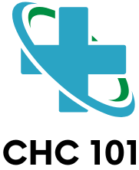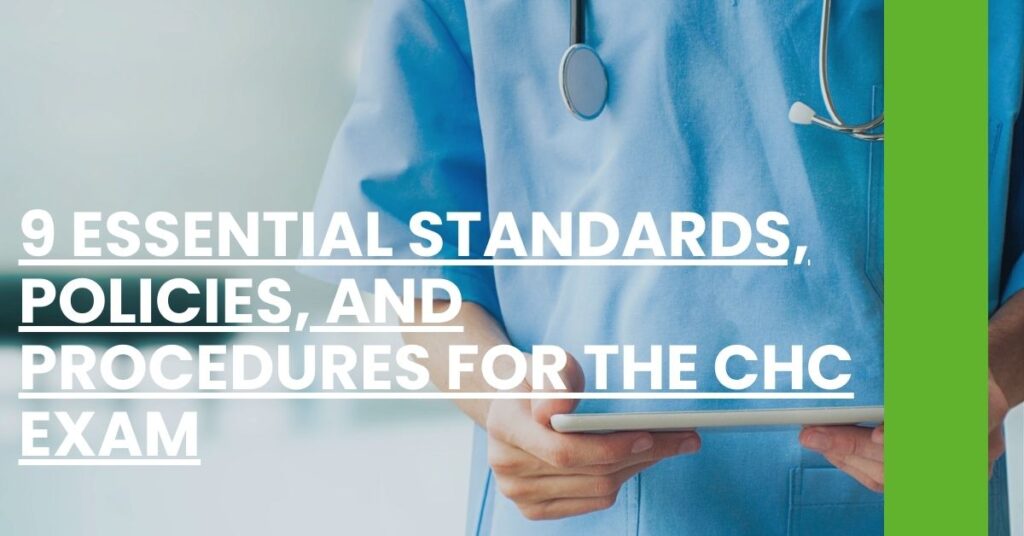Are you focused on mastering the Main Standards, Policies, and Procedures for the CHC exam?
The stakes are high, and the regulatory landscape is complex. Tailored for healthcare compliance professionals, this article cuts through the clutter, offering key insights into the essential standards, policies, and procedures that form the backbone of the CHC exam.
Upfront, no-nonsense, and packed with critical information, this post is your strategic guide to navigating the nuanced world of healthcare compliance.
- 1. Overview of Health Care Compliance
- 2. Core Health Care Regulations
- 3. Effective Compliance Programs
- 4. Risk Management Strategies
- 5. Policies and Procedures Development
- 6. Enforcement of Compliance Standards
- 7. Ethics in Health Care Compliance
- 8. Privacy and Security of Health Information
- 9. Continuing Education for Compliance Officers
- Exam Preparation Resources
- Steps to Getting Certified
- Conclusion: Launching Your Health Care Compliance Career
1. Overview of Health Care Compliance
Navigating the complex lattice of health care compliance may seem daunting at first, but it forms the bedrock of a system that ensures patient safety and organizational integrity. At its core, health care compliance encompasses the creation and enforcement of policies and procedures designed to prevent, detect, and address violations of laws and regulations within the health care industry. Here are key components you should be proficient in:
- Regulatory Knowledge: Understanding federal and state health care laws and regulations is non-negotiable.
- Internal Policies: Developing internal guidelines that align with legal requirements.
- Education and Training: Conducting regular trainings to ensure staff members are up-to-date on compliance issues.
- Monitoring and Auditing: Implementing processes for continuous oversight of compliance within the organization.
Immersing yourself in these topics will not only prepare you for the Certified in Healthcare Compliance (CHC) exam but set the foundation for a robust career ensuring adherence to main standards, policies, and procedures.
2. Core Health Care Regulations
Understanding core health care regulations is a pillar in prepping for the CHC exam. These form the very rules of engagement for health compliance officers. You’ll need a solid grip on the following:
- Anti-Kickback Statute (AKS): Shields against improper financial incentives.
- Stark Law: Regulates physician referrals.
- False Claims Act: Protects against fraudulent billing.
- Health Insurance Portability and Accountability Act (HIPAA): Safeguards patient health information.
The legal landscape of health care is always evolving, so staying abreast of current regulations and their interpretations is crucial for compliance and passing the CHC exam.
3. Effective Compliance Programs
An effective compliance program is not simply about rule-following; it’s about fostering a culture where compliance is woven into the fabric of everyday operations. Key elements include:
- Leadership Engagement: An engaged leadership team sets the tone.
- Compliance Officer and Committee: These are the stewards of the compliance program.
- Training: Empowering employees with knowledge and skills.
- Auditing and Monitoring: Regular checks to ensure procedures are followed.
For detailed guidance on structuring such programs, the Office of Inspector General’s compliance tips are an invaluable resource that resonates with the ethos of the CHC exam.
4. Risk Management Strategies
Effective risk management is about predicting the weather patterns of the health care compliance environment. Here’s what you need to know:
- Risk Assessment: Identifying potential areas of vulnerability.
- Risk Mitigation: Developing strategies to reduce or eliminate risks.
- Crisis Management: Preparing for potential compliance incidents.
This requires understanding the intricate dynamics of health care operations and patient care and being informed by resources like The Institute of Medicine’s report ‘To Err is Human‘ to optimize safety and compliance.
5. Policies and Procedures Development
Creating health care policies and procedures is akin to drafting a playbook that ensures the entire team is synchronized in their approaches to patient care and compliance. Essential steps include:
- Assessment of Needs: Tailor policies to specific organizational needs.
- Research: Align with industry standards and regulatory requirements.
- Drafting and Approval: Construct clear, concise, and comprehensive policies.
- Implementation and Training: Ensure effective rollout and understanding across the organization.
Knowledge of practical guides can be helpful, but remember, each organization requires a customized approach that adheres to the main standards, policies, and procedures for the CHC exam.
6. Enforcement of Compliance Standards
Enforcing compliance standards is a matter of maintaining balance; too lenient, and risks go unchecked; too rigid, and you could stifle the necessary flexibility within your team. Here’s what to focus on:
- Consistent Application: Apply rules impartially across the board.
- Disciplinary Action: Have clear consequences for non-compliance.
- Feedback Loop: Use enforcement outcomes to improve policies and procedures.
Taking note of enforcement actions by regulatory bodies can give insights into the ramifications of not following the book, driving home the importance of this domain in the CHC exam preparations.
7. Ethics in Health Care Compliance
Within the realm of health care compliance, ethics is not just a concept; it’s a guiding star. Aligning your behaviors and practices with ethical standards ensures not only that your organization is compliant, but also that it upholds the highest standards of care and integrity. Here’s what you should keep at the forefront of your ethical compass:
- Patient Advocacy: Always put the interests and wellbeing of patients first.
- Transparency: Foster trust by being open about your practices and decisions.
- Integrity: Maintain consistency between your words and actions.
- Fairness: Ensure that all patients and staff are treated with equality and respect.
The crux of ethics in healthcare compliance is nurturing a culture where making the right choice is natural and expected. The interplay between compliance and ethics ensures a higher quality of care, a sentiment echoed in the core values reflected in the CHC exam.
8. Privacy and Security of Health Information
Your role in safeguarding the privacy and security of health information cannot be overstated. It’s a responsibility that calls for a deep understanding of the regulations and a commitment to protective measures. Here are the pillars that uphold this aspect of health care compliance:
- Understanding HIPAA: Know the ins and outs of the Health Insurance Portability and Accountability Act.
- Data Security: Implement and maintain robust cybersecurity measures.
- Patient Rights: Recognize and advocate for the rights of patients to access and control their health information.
Diligence in this area is about much more than passing an exam; it’s about protecting the sanctity of patient information and maintaining trust in the health care system—a key area of focus in your CHC exam prep.
9. Continuing Education for Compliance Officers
To truly excel in the evolving landscape of health care compliance, you must commit to lifelong learning. Continuing education is not just a post-certification requirement; it’s a pathway to excellence that ensures you stay ahead of the curve. Here’s how you should approach continuous learning:
- Stay Current: Keep up-to-date with new laws, regulations, and industry trends.
- Engage with Peers: Learn from the experiences and insights of your fellow compliance professionals.
- Seek Specialized Training: Enroll in courses that deepen your knowledge in specific areas of compliance.
The Compliance Certification Board’s CEU requirements reflect the ongoing nature of your professional development—integral to your success in the CHC exam and your future career growth.
Exam Preparation Resources
When it comes to passing the CHC exam, having the right study materials at your disposal can make all the difference. Consider incorporating these invaluable tools into your preparation strategy:
- CHC Candidate Handbook: Your go-to guide for comprehensive exam details.
- Practice Tests: Gauge your readiness and identify areas for improvement.
- Study Groups: Collaborate with peers to enhance your understanding of complex concepts.
Leverage resources that best align with your learning style, and remember that adequate preparation is synonymous with confidence on exam day.
Steps to Getting Certified
Charting a path to becoming a healthcare compliance officer involves several methodical steps. Approach this journey systematically:
- Educational Foundation: Attain a baseline of knowledge in healthcare or a related field.
- Experience in Healthcare: Gain practical experience in a healthcare setting to understand real-world applications.
- Preparation: Dive deep into study materials and courses tailored to the CHC exam.
- Certification: Register, sit for, and pass the CHC examination.
- Professional Growth: Engage in continuing education and networking to advance your career.
Every step brings you closer to not just meeting the main standards, policies, and procedures for the CHC exam, but excelling at them and setting a benchmark for compliance excellence.
Conclusion: Launching Your Health Care Compliance Career
In conclusion, your journey towards the CHC exam encapsulates a broad expanse of knowledge—from the intricacies of regulations to the embodiment of ethical practices. But it’s more than that. It’s about cementing a commitment to lifelong learning, championing the rights and safety of patients, and ultimately launching a career on the bedrock of integrity and expertise.
Let this be your mantra: embody the main standards, policies, and procedures for the CHC exam, see them not just as a hurdle to clear but as a harmonious part of the mission to elevate health care to higher standards of compliance and care. With dedication, the right resources, and a steadfast focus on these tenets, your certification is within reach—and your impact on the world of health care, immeasurable.

